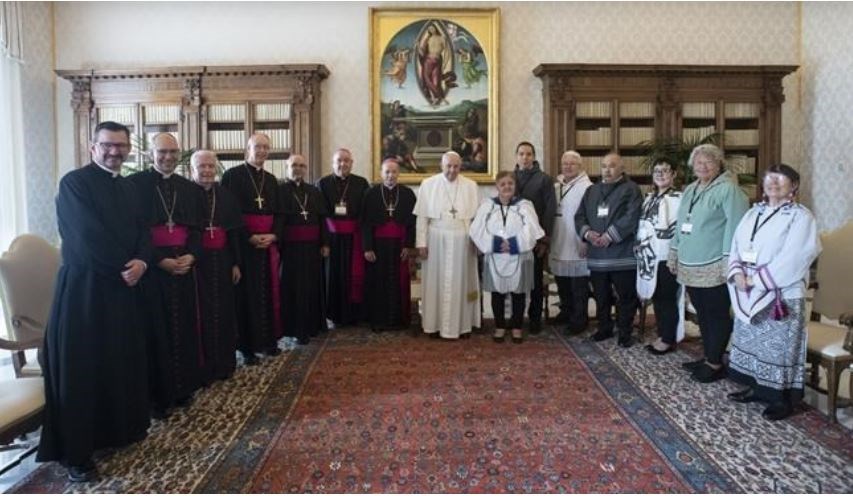The papal apology to the Indigenous peoples of Canada on April 1 was an extraordinary moment for the individuals whom Pope Francis addressed directly, but it also has the potential for much broader implications.
In the days leading up to the apology, Francis listened intently and embraced the pain of the residential school survivors who spoke to him. The courage, strength, and determination of these individuals cannot be understated. As a lifelong Catholic, I never expected the church institution to be so unobstructed. I had always found it defensive and resistant to criticism; but here was the Pope opening his heart to the truth of abuses committed by the people who had vowed devotion to that church.
Francis followed his audiences with an apology where he admitted feeling “sorrow and shame” for the actions of those who held positions of authority. The people in attendance were clearly moved. Inuit leader Natan Obed stated, “I was touched by the way in which he expressed his sorrow, and also the way in which he condemned the actions of the church.”
The Pope also promised to come to Canada to speak directly to Indigenous people on their own land.
Both the apology and the commitment to visit Canada are important steps in reconciliation, but they are only steps. To find a way forward after the cultural genocide of the residential school system, the Canadian government commissioned an Indigenous-led Truth and Reconciliation Commission. They published 94 Calls to Action in 2015. Call to Action #58 states that the Pope will offer an apology for the church’s role and that the apology will be delivered in Canada.
The papal apology is a historical progression. People resistant to reconciliation can try to stall the process, but they can never turn it back. Of course, an apology only leads to reconciliation if it is followed by meaningful action. Pope Francis seems determined to journey with our Indigenous neighbours and find the reconciliation needed to heal our country and his church.
The global significance of this process cannot be understated. The Catholic Church is among the oldest institutions in the world. It was the most influential body in Europe at the beginning of the age of colonization and it played an active role in the colonization of other continents. Its doctrine was used to justify the subjugation and exploitation of people all over the world. When Spain and Portugal were arguing over the areas they would colonize, they went to the Catholic Church to settle the dispute. The Pope’s religious order, the Jesuits, bought and sold human beings and used them as forced labourers. Many Christian countries are guilty of genocide toward Indigenous peoples, though few have acknowledged it.
Colonization has left our world deeply wounded. The leader of the Catholic Church apologizing for what happened in residential schools in Canada is not inconsequential. It can potentially open the floodgates to the reconciliation and healing our world so desperately needs. Keep in mind, for example, that the Canadian government sent delegations to the United States in the late 1800s to study their model for running residential schools, and the American government has yet to apologize for the genocide committed against their Indigenous peoples. A papal apology puts significant moral pressure on their leaders, including their Catholic president Joe Biden, to embrace the healing process.
Perhaps the Catholic Church is too entrenched in its ways to bring about significant change in the world. Perhaps this apology to the Indigenous delegation from Canada was just a gesture from a kind, old, renegade pope.
But perhaps it wasn’t. Wouldn’t it be wonderful to be able to speak the truth, to heal our broken spirits and to heal our world?
Gerry Chidiac is a Prince George writer.


